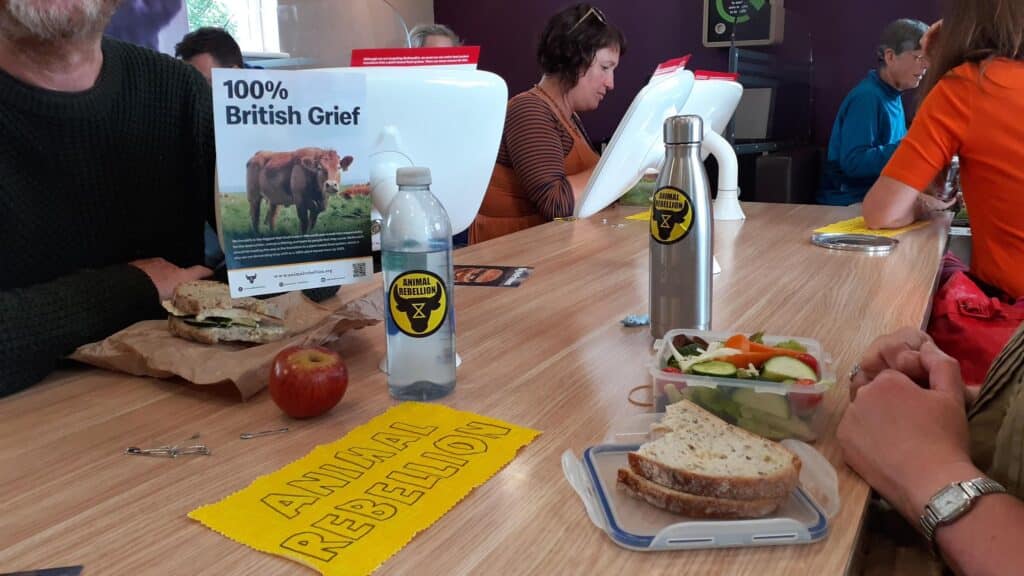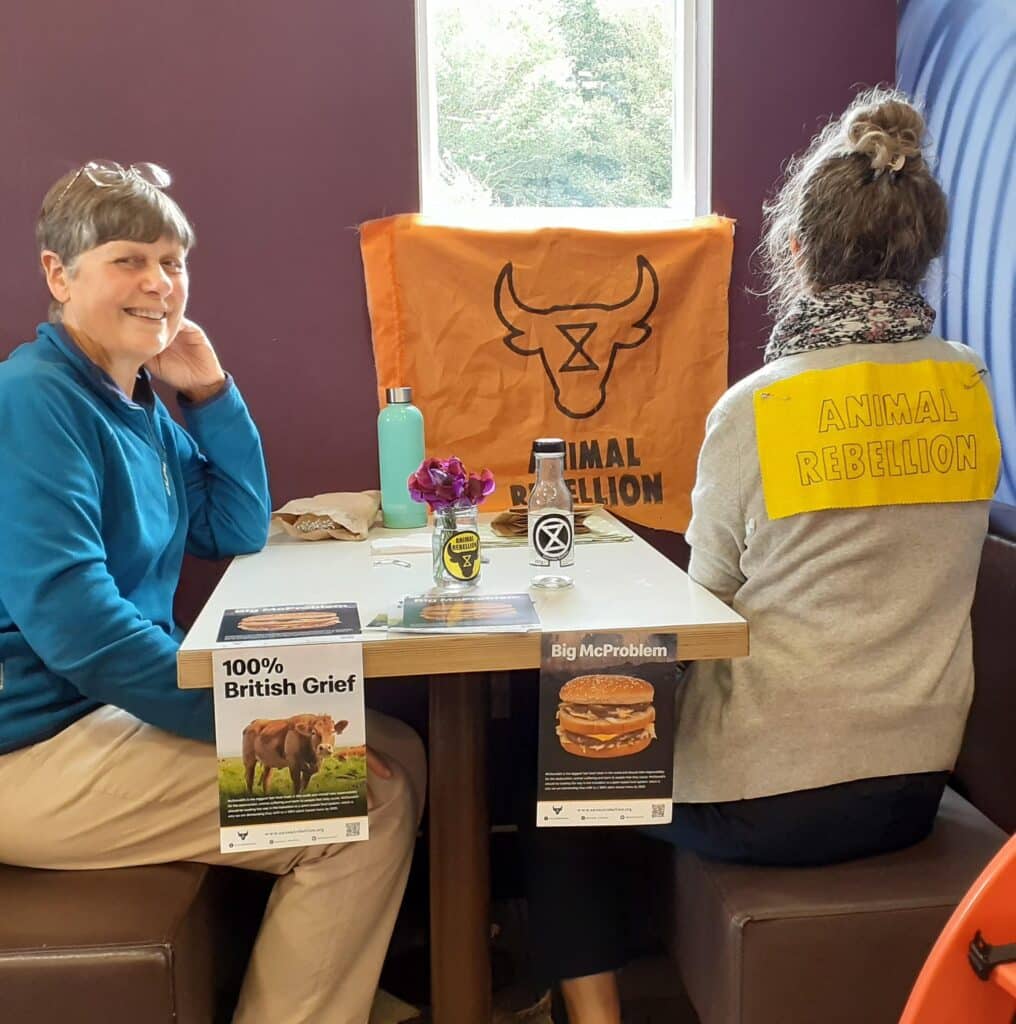Climate activists held a sit-in protest at Dorchester McDonald’s on Sunday, demanding that the fast food chain moves towards a plant-based menu.
The protesters also want to shine a light on the environmental ‘knock-on’ effect from bulk carriers of animal feed coming into Portland Port and being transported through the county by HGV’s.
Branded a McSit-in, they brought their own lunches and occupied areas of the restaurant for 2 and a half hours, insisting that the fast-food chain takes responsibility for the destruction they say it causes on our planet. The protest follows similar sit-ins held in Weymouth and Yeovil McDonald’s branches, as well as McDonald’s branches across the country.
Kira Robinson, a local climate activist at Sunday’s sit-in, said: “The climate and ecological emergency that we are facing is critical, and we need corporations to take the lead and do everything they can to minimise their impact on the climate. When it comes to food, that means transitioning to plant-based.”

“McDonald’s and the wider intensive animal agriculture industry is responsible for huge levels of deforestation, and is a major driver of climate change. Investigations have shown that McDonald’s livestock feed comes from deforested areas of Brazil and Bolivia.”
“A fully plant-based McDonald’s may sound odd, but it is actually a very reasonable demand when we consider the scale of the crisis that we are facing.”
This local action comes after Animal Rebellion, a sister organisation to Extinction Rebellion, blockaded the McDonald’s burger factory in Scunthorpe, which they claim is the only producer of McDonald’s burgers in the country. The factory, which makes up to 3 million beef patties a day for McDonald’s, was shut down for almost three days by activists who used bamboo structures and trucks to block the entrance.

In May, around 100 Animal Rebellion activists blockaded all four of McDonald’s UK distribution centres, effectively shutting down the UK supply chain of the biggest fast food company in the world. 1,300 restaurants were affected by the blockades, which lasted between 19 – 30 hours.
Kira said: “We want to be clear that we are not criticising individual diet choices. We are targeting the McDonald’s corporation, and not it’s customers. We want McDonald’s to adopt a more responsible business model – one that is better for our planet and also for people’s health. Advances in food technology are so good that you can barely taste the difference between a plant-based burger and a beef burger, but the difference in impact on our planet is enormous.”
“As the biggest fast food corporation in the world, McDonald’s has a responsibility to lead the way to a more sustainable future”.
Scientists widely agree that meat and dairy consumption are major contributors to climate breakdown. In his latest documentary, Sir David Attenborough said that “we must change our diets … the planet simply cannot support billions of meat-eaters”.
Scientists recently confirmed that the Amazon is now emitting more carbon dioxide than it is able to absorb, with most of the fires deliberately set to clear land for grazing and to grow soy for livestock feed. The government-commissioned National Food Strategy, published in July and led by Henry Dimbleby, recommended that the government set a target to reduce the nation’s meat consumption by 30% by 2030.
Rose Patterson, a spokesperson for Animal Rebellion, said: “We’re living in a time where massive change is possible, but our window to act on the climate crisis is closing quickly. The meat and dairy industries are responsible for 80-90% of Amazon deforestation, at least 18% of global emissions… To save ourselves and the future of our children, we must start transitioning towards a plant-based food system.”
Jon Williams, another activist at Sunday’s sit-in, said: “The quantity of meat and dairy that we are currently consuming is just not sustainable for our planet.
“McDonald’s has a real opportunity to lead on this, but currently other chains are doing far more. Wagamama has committed to going 50% plant-based by the end of this year. That’s the kind of bold action we need to see from all food chain corporations”.
The Dorchester McSit-in activists are also keen to shine a light on the environmental ‘knock-on’ effect of soya and other animal feed being brought from South America and across the world into Portland Port by Glencore Agriculture UK, recently rebranded to Viterra. The bulk carriers which are used to bring in the animal feed operate on what is known as ‘heavy fuel’, or ‘dirty fuel’.
Anne Wilson, a Dorchester resident, said: “The feed is loaded onto diesel HGV’s which trundle across the Portland causeway and through Weymouth. Some lorries will come up to Monkey’s Jump roundabout, where Dorchester McDonald’s is situated, and continue on the A35 through the village of Chideock, which is known as the village with the worst air pollution in England, going on to Devon and Cornwall. Other vehicles go north on to the A37 to Yeovil, Somerset and beyond.
“These HGV’s are responsible for massive air pollution at a time when asthma, especially in children, is on the increase.”
https://www.viterra.com/glencore-agriculture-rebranded-to-viterra
https://www.forbes.com/what-is-heavy-fuel-oil,-and-why-is-it-so-controversial
https://www.uk.news.yahoo.com/Dorset-village-has-worst-air-pollution-in-england
www.theguardian.com/air-pollution-linked-to-huge-rise-in-child-asthma-go-visits
www.totallyveganbuzz.com/news/wagamama-vegan-menu
https://www.bbc.co.uk/news/uk-57838103
PLEASE SUPPORT US FOR JUST £2 A MONTH







